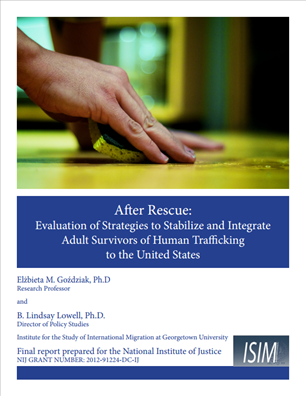After Rescue: Evaluation of Strategies to Stabilize and Integrate Adult Survivors of Human Trafficking to the United States
Human trafficking for forced labor, domestic servitude, and sexual exploitation is a transnational crime whose victims include men, women, and children. In the United States, trafficking in persons became a focus of activities in the late 1990s and culminated in the passage of the Trafficking Victims Protection Act (TVPA), which was signed into law in 2000. Despite the increased interest in human trafficking, there is little systematic and methodologically rigorous empirical research. Notably absent are studies of adult foreign-born trafficked victims who are identified and, as survivors, provided services to facilitate their reintegration into the wider society. This project examines comprehensive case management services provided to foreign-born adults survivors of trafficking from 2006 to 2011. These programs were funded by the Anti-Trafficking in Persons (ATIP) Program of the Office of Refugee Resettlement (ORR) under the Per Capita Reimbursement Contract administered by the U.S. Conference of Catholic Bishops (USCCB). The USCCB was also in charge of providing training and technical assistance to the programs serving survivors of human trafficking. This report provides a summary of the analysis of data collected by USCCB and augmented by field research with selected number of programs. The objective of this mixed-methods study was to better understand the characteristics of trafficking survivors and the efficacy of interventions in stabilizing their well-being.
Author: Elzbieta Gozdziak, Ph.D., B. Lindsay Lowell, Ph.D.
Federal Sponsor Agency: NIJ
Provider: Institute for the Study of International Migration at Georgetown University
Publication Date: 2016
